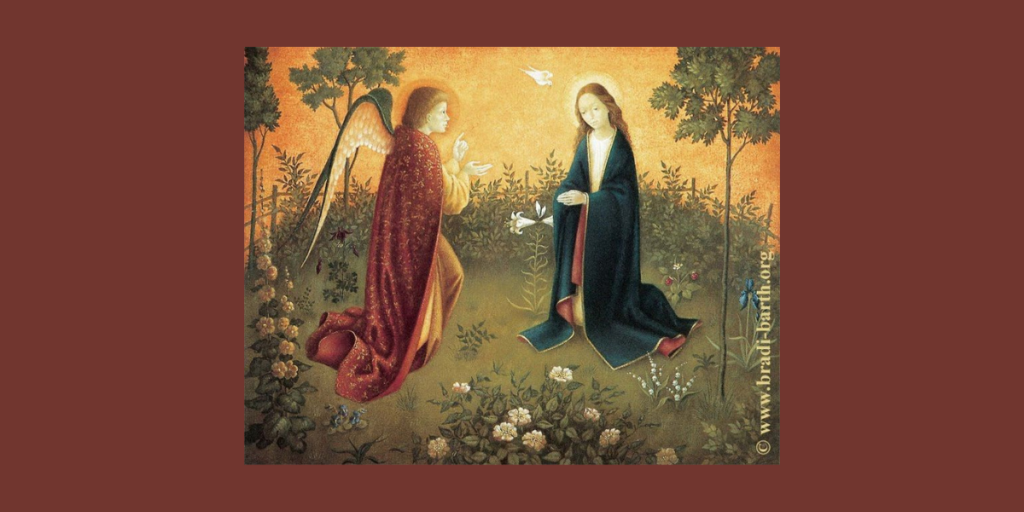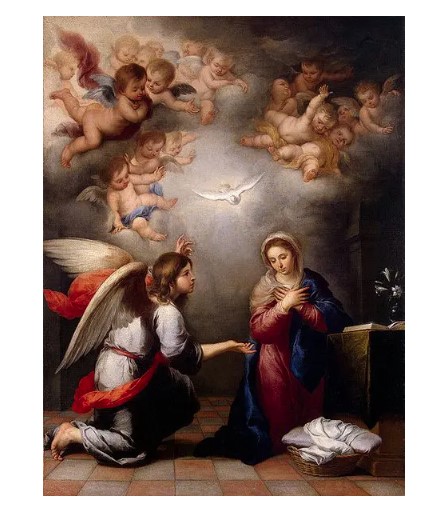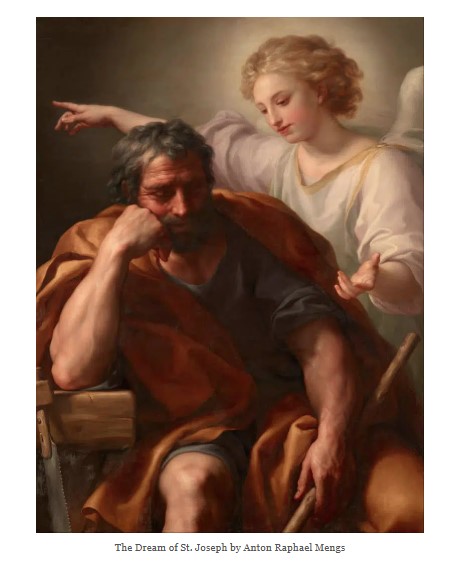
The Day of the Unborn Child: The Incomparible Value of Every Human Life
By: Fr. Shenan J. Boquet, updated March 24, 2025, Human Life International
When Pope St. John Paul II released his extraordinary pro-life encyclical Evangelium vitae, he fittingly did so on March 25, the Feast of the Annunciation. On this day, the Universal Church celebrates two great mysteries: The moment when the Godhead first took on human flesh, and became incarnate within the womb of Mary; and Mary’s fiat, her free, total act of trust in God, by means of which she became Theotokos, “Mother of God,” and thereby the instrument by which God brought about His plan of salvation for the whole human race.
Though Christ entered the world in a more visible way at the moment of His birth in Bethlehem, He had, in fact, already been present on earth for nine months. The incarnate God, having taken on the form of a tiny human embryo, humbly submitted Himself to the hidden process of biological development through which every human being passes, thus sanctifying the life of every child and every life from the moment of conception.
Every human life, without exception, is such a miracle that we ought to be awestruck every time we learn that a child has been conceived. However, we live in a world scarred by the effects of sin, which can obscure the ability of individuals and society to recognize the intrinsic value or dignity in human life. This situation is enabled and emboldened by the progressive moral weakening of individual consciences and a society that has become desensitized to the respect owed to the human person, blind to the crimes and violence of abortion, and the exploitation and commercialization of preborn children.
Consequently, many are unable to discern what is good, true, and beautiful from what is evil, false, and grotesque. The lines have become distorted. Even when the news of the conception of a child is met with joy, that joy is often mixed with fear and anxiety. In many cases, fear and anxiety overwhelm joy, so that the new life, instead of being welcomed and celebrated, is looked upon as a burden and a threat.
Catholics believe that “being in the image of God, the human individual possesses the dignity of a person, who is not just something, but someone. He is capable of self-knowledge, of self-possession and of freely giving himself and entering into communion with other persons. And he is called by grace to a covenant with his Creator, to offer him a response of faith and love that no other creature can give” (Catechism of the Catholic Church, no. 357).
Indeed, at the very heart of the Christian faith is the embodied affirmation of this great truth: that human life is worth living, and that no matter how great the uncertainty or the possible suffering, it must be welcomed with open arms and with great faith and trust. God Himself took on the human form and lived on this earth, showing us once and for all that human beings possess a dignity and value that far surpasses what can be put into words.
The Incarnation
Regarding the first mystery, the Incarnation, we know that God created man in His own image (Gen 9:6). And because of that image, which is expressed most clearly in man’s capacity for rationality and free choice, human beings possess a dignity far above that of any of the other animals. Indeed, humans possess the awesome potential for intimate friendship with God – something no other creature, except the angels, can boast. Nor can that dignity ever be completely erased, whether through sin or through any other misfortune such as sickness, debility, poverty, enslavement, or violence.
Tragically, human beings have often failed to recognize and honor the dignity of their brothers and sisters, starting with Cain’s treatment of his brother Abel. History is rife with examples of one group of human beings denying the intrinsic worth of another group, thereby justifying all manner of atrocities. In ancient pagandom there was no doctrine of universal human rights because there was no doctrine of universal human dignity. Failing to recognize the image of almighty God in others, humans have slaughtered and enslaved one another for millennia.
However, something changed or, perhaps, was reaffirmed in a startling and dramatic fashion – when Christ took on corruptible human flesh. This extraordinary act of self-abnegation affirmed once and for all the value of each human life. As held by the Fathers of the Church, the tradition is strong that Christ’s incarnation both healed something in human nature and revealed something that was already there. The Second Vatican Council upholds this understanding in Gaudium et spes saying that Christ “fully reveals man to man himself and makes his supreme calling clear.” That same document eloquently continues:
To the sons of Adam [Christ] restores the divine likeness which had been disfigured from the first sin onward. Since human nature as He assumed it was not annulled, by that very fact it has been raised up to a divine dignity in our respect too. For by His incarnation the Son of God has united Himself in some fashion with every man. He worked with human hands, He thought with a human mind, acted by human choice and loved with a human heart. Born of the Virgin Mary, He has truly been made one of us, like us in all things except sin (no. 22).
People tend to judge the worth of another by the value of their capacities, contributions, and appearance. Christ’s decision to take on human flesh, however – not in the perfect, developed form of a mature man, but as a tiny embryo in His mother’s womb – stands as the ultimate rebuke to this tendency.
Christ in His mother’s womb at the moment of His conception was as much our God and Savior as He was over three decades later, dying on the Cross. This idea isn’t just theological speculation without any practical consequences. Here is the seed of a revolution. And as Christianity spread across the world, the seed of that revolution blossomed, until universal human rights became a notion that is now taken for granted. Our civilization denies the small and the helpless any value, so we destroy our preborn brothers and sisters by the millions for no other reason than “inconvenience.” This is because we have forgotten or denied the mystery of the Incarnation.
Mary’s Fiat
Pope St. John Paul II concluded Evangelium vitae with a reflection on Mary’s role in the Gospel of Life. He wrote:
The one who accepted ‘Life’ in the name of all and for the sake of all was Mary, the Virgin Mother; she is thus most closely and personally associated with the Gospel of Life. Mary’s consent at the Annunciation and her motherhood stand at the very beginning of the mystery of life which Christ came to bestow on humanity (cf. Jn 10:10). Through her acceptance and loving care for the life of the Incarnate Word, human life has been rescued from condemnation to final and eternal death (no. 102).
Mary, in saying “yes” to the will of God, opened herself up to great joy, but also to great uncertainty and great pain. “This child is set … for a sign that is spoken against – and a sword will pierce through your own soul also – that thoughts out of many hearts may be revealed” (Lk 2:34-35). As such, she is the icon of every woman who discovers that she is expecting a child. For just as there is no life without the possibility of great hope and joy, neither is there life without the risk of great uncertainty and pain. For some women in some circumstances, the anticipation of love and joy will predominate in their response to pregnancy; for others, the uncertainty and the foreboding of pain will predominate. Mary provides the example for both: complete submission to God’s will, not in a spirit of servile fear, but of loving trust in the goodness of God.

The abortion industry feeds off fear and despair. Where there is hope and love, there is no abortion. What women need more than anything is to heed the exhortation of the angel to Mary – “Do not be afraid!” (Lk 1:30) – and Mary’s own example – “May it be done to me according to your word” (Lk 1:38). Just as Bethlehem is an icon of what the family can and should be, so too the Annunciation is an icon of the correct response to new life. Mary’s fiat thus provides the central message of hope, the imitation of which has the power to end the abortion holocaust.
It is worth noting, however, that Pope St. John Paul II broadens his interpretation of the Annunciation, finding in Mary’s response, and in the Angel’s message, a message of hope not just for individual women, but also for the whole Church. “Mary is a living word of comfort for the Church in her struggle against death,” he wrote in Evangelium vitae. “Showing us the Son, the Church assures us that in Him the forces of death have already been defeated” (no. 105).
Joseph’s Trust
St. Joseph stands for us as the emblem of the courageous father. Faced with mysteries far beyond his comprehension, including the conception of a child through the action of the Holy Spirit, St. Joseph responded with absolute trust in God, assuming a task for which he was unquestionably “unworthy” and “unprepared.”
Who, after all, was he to act as foster-father to the God-Man? Who was he, poor carpenter that he was, to outwit Herod, or to shoulder the enormous responsibilities of providing a suitable life for the Virgin Mary and Christ? St. Joseph had every right to feel fear and anxiety! And yet, he trusted and embraced his vocation; he welcomed life.
The great tragedy of our society’s acceptance of abortion is that it trains men and women not to face their fears and anxieties with courage, but rather to look for an escape route. But in providing an escape route, abortion not only robs the child of life, but it also robs the parents of the opportunity to grow in love and to open their hearts to the gifts their child might have brought them.
If only every mother and father the world over would respond to new life with the same trust as the Virgin Mary and St. Joseph, abortion would be eradicated overnight! What a gift the Church gives us by placing these two saintly models before us.

The Day of the Unborn Child
Pro-life activists have long recognized the close connection between the Solemnity of the Annunciation and their mission to ensure that every human life is welcomed, loved, served, and protected. For that reason, the pro-life movement in many countries celebrates The Day of the Unborn Child.
This celebration has spread across the globe, becoming a symbol of the value and dignity of every human person from the moment of fertilization (i.e., conception), as well as a day of remembrance for those preborn children who have lost their lives to the violence of abortion.
The Day of the Unborn Child reminds us that human beings, made in the image of God, possess something no other creature (except the angels) can boast – the potential for intimate friendship with God. The human person, moreover, enjoys a dignity far surpassing that of any other of God’s creations. This dignity is of incomparable value; it is innate and immutable; it can never be completely erased, whether through sin or any other misfortune.
Today, the atrocities against human dignity remain vividly manifest in the evils of abortion, infanticide, euthanasia, and embryonic stem cell research. Many in society approach nascent life with complete disregard, intentionally ignoring and rejecting the developing child’s inalienable human dignity. Moreover, the human embryo, the most vulnerable of our race, is often treated as a commodity, regarded as a mere object for medical and scientific research and advancement (a multi-billion-dollar industry).
A preborn child is not just a blob of tissues or a clump of cells or an “it” or “thing,” but rather from the moment of fertilization, a human boy or girl is of incomparable value, a unique human person. As Pope Francis says, “Every human life, unique and unrepeatable, valid in itself, constitutes an inestimable value,” which “must always be announced again, with the courage of the word and the courage of actions.”
As we prepare to celebrate the Solemnity of the Annunciation and the Day of the Unborn Child, let us again heed the appeal of Pope St. John Paul II in the message he delivered in the Basilica of Our Lady of Guadalupe, where the miraculous image of Our Lady depicts the Blessed Virgin as pregnant with the Christ-Child. The sainted pope said he wished to make an appeal:
To banish forever every attack against life and to express the hope at the same time that ‘the continent of hope’ will also be the continent of life…a life that is worthy for all! … I express my best wishes that the celebration of ‘The Day of the Unborn Child’ will favor a positive choice in favor of life and the development of a culture in this direction which will assure the promotion of human dignity in every situation.
Amen!
The crimes against human life, especially against the humanity of the preborn child, will never cease unless we demand their complete and unequivocal end. This is the hour to stand in solidarity with the preborn. Let us be united in this effort, bearing witness to Truth.
My hope is that every person will use The Day for the Unborn Child as an opportunity to raise greater awareness about the dignity of human life, to pray for an end to violent crime against nascent life, for healing of those who have procured an abortion or encouraged or participated in one, for every life, without exception, to be cherished and loved, for all who tirelessly work to defend and serve life, and for our nation to become a genuine Culture of Life.
We cannot pretend to believe that a human force alone will cast out the darkness of abortion and its repulsive industry and sever the grip of the culture of death, which penetrates our world deeply and is in the minds and hearts of people. To defeat evil and counteract the culture of death, we need to bend our knees in prayer, do penance, and offer reparation. Please join me in praying:
Father and maker of all, you adorn all creation with splendor and beauty and fashion human lives in your image and likeness. Awaken in every heart reverence for the work of your hands, and renew among your people a readiness to nurture and sustain your precious gift of life. Grant this through our Lord Jesus Christ, your Son, who lives and reigns with you in the unity of the Holy Spirit, God forever and ever. Amen
(Source: USCCB)
Fr. Shenan J. Boquet is president of Human Life International, and a leading expert on the international pro-life and family movement.
